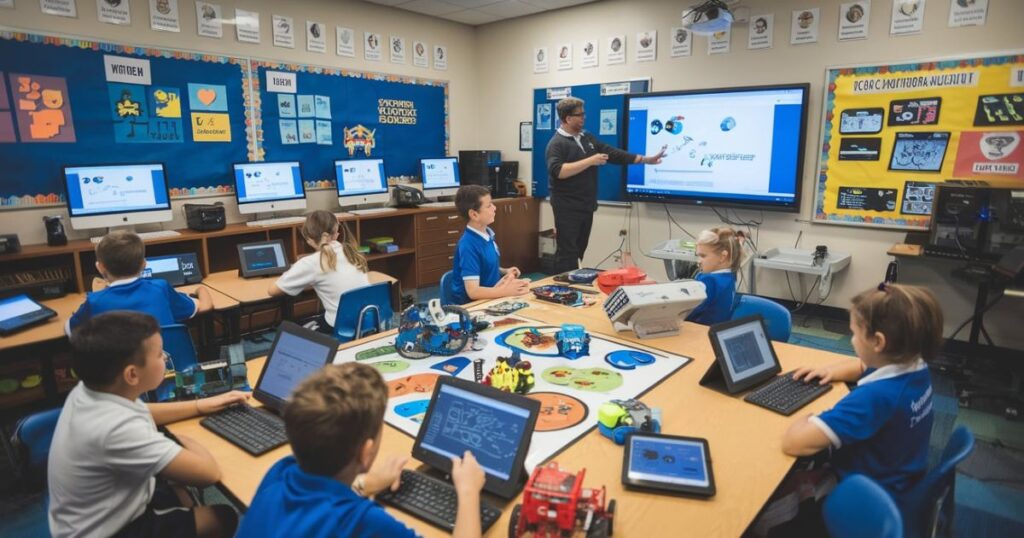Understanding Basic Technology Concepts
Technology has become an integral part of our daily lives, shaping how we communicate, work, and interact with the world around us.
Understanding fundamental technology concepts is crucial for navigating today’s digital landscape.
From smartphones to cloud computing, these technologies continue to evolve and transform our society in profound ways.
The digital revolution has introduced numerous innovations that have become essential tools for both personal and professional use.
What is Digital Technology?
Digital technology encompasses all electronic devices and systems that use digital signals to process and transmit information. This technology has revolutionized how we store, process, and share data.
At its core, digital technology converts information into binary code – sequences of ones and zeros – which computers can process. This fundamental concept underpins everything from basic calculators to sophisticated artificial intelligence systems.
The evolution of digital technology has been remarkable, transitioning from simple computational devices to complex systems that power smart cities and autonomous vehicles.
Digital transformation has become a crucial factor in business success, with companies investing heavily in technological infrastructure to remain competitive in the modern marketplace.
The Role of Operating Systems
Operating systems serve as the backbone of our digital devices, managing hardware resources and providing services for computer programs.
They act as intermediaries between users and computer hardware, making it possible to perform tasks without understanding the complex underlying processes.
Modern operating systems like Windows, macOS, and Linux have evolved to become more user-friendly while maintaining robust security features.
Understanding how operating systems work is essential for both casual users and professionals. They handle critical functions such as memory management, file system operations, and process scheduling.
The choice of operating system can significantly impact user experience, software compatibility, and system performance.
Read This Post: How Much Is Ultrasound Tech School
Advanced Technology Topics
Cloud Computing and Its Impact
Cloud computing has transformed how businesses and individuals store, access, and process data.
This technology provides scalable resources on-demand, enabling organizations to reduce infrastructure costs while increasing operational efficiency.
Cloud services have become essential for remote work, data backup, and application deployment.
The three main service models in cloud computing are Infrastructure as a Service (IaaS), Platform as a Service (PaaS), and Software as a Service (SaaS). Each model serves different needs and provides varying levels of control and responsibility.
The adoption of cloud technology continues to grow as organizations recognize its benefits in terms of flexibility, scalability, and cost-effectiveness.
Artificial Intelligence and Machine Learning
Artificial Intelligence (AI) and Machine Learning (ML) represent the cutting edge of technological advancement.
These technologies are revolutionizing industries from healthcare to finance, enabling automation and intelligent decision-making at unprecedented scales.
Deep learning algorithms can now perform complex tasks such as image recognition, natural language processing, and predictive analytics with remarkable accuracy.
The impact of AI extends beyond technical applications, raising important questions about ethics, privacy, and the future of work.
As these technologies continue to evolve, understanding their capabilities and limitations becomes increasingly important for professionals across all sectors.
Cybersecurity and Privacy
Understanding Digital Security
Cybersecurity has become a critical concern in our interconnected world. The rise of cyber threats requires individuals and organizations to implement robust security measures to protect sensitive information.
Network security, endpoint protection, and data encryption form the cornerstone of modern digital security strategies.
The complexity of cyber threats continues to evolve, with attackers employing sophisticated techniques to breach security systems.
Understanding common attack vectors and implementing appropriate countermeasures is essential for maintaining digital security.
Regular security audits and updates help identify and address potential vulnerabilities before they can be exploited.
Privacy in the Digital Age
Digital privacy has become a significant concern as more aspects of our lives move online. The collection and use of personal data by companies and organizations raise important questions about consent, transparency, and data protection.
Data privacy regulations such as GDPR and CCPA have established frameworks for protecting individual privacy rights.
Understanding privacy settings and implementing appropriate security measures helps protect personal information from unauthorized access and misuse.
The balance between convenience and privacy continues to be a critical consideration in the development and use of digital technologies.
Future Technology Trends

Emerging Technologies
The technological landscape continues to evolve with emerging technologies shaping the future. Internet of Things (IoT), blockchain, and quantum computing represent some of the most promising developments in the field.
These technologies have the potential to transform industries and create new opportunities for innovation.
Understanding emerging technologies helps individuals and organizations prepare for future changes and opportunities.
The convergence of different technologies often leads to breakthrough innovations that can disrupt existing business models and create new markets.
Sustainable Technology
Sustainability has become a crucial consideration in technology development. Green technology initiatives focus on reducing environmental impact while maintaining technological progress.
Energy-efficient devices, renewable energy systems, and sustainable manufacturing processes represent important developments in this area.
The integration of sustainable practices in technology development helps address environmental challenges while creating new opportunities for innovation.
Understanding the environmental impact of technology choices enables better decision-making for long-term sustainability.
Practical Applications
Technology in Business
Technology has transformed how businesses operate, communicate, and deliver value to customers.
Digital transformation initiatives help organizations improve efficiency, reduce costs, and enhance customer experience.
The adoption of technology solutions has become essential for maintaining competitiveness in the modern business environment.
Understanding how to effectively implement and manage technology in business contexts is crucial for success.
From customer relationship management to supply chain optimization, technology plays a vital role in modern business operations.
Personal Technology Use
The proliferation of personal technology has changed how individuals communicate, work, and entertain themselves.
Smart devices, mobile applications, and digital services have become integral parts of daily life.
Understanding how to effectively use and manage personal technology helps maximize its benefits while minimizing potential drawbacks.
Digital literacy has become essential for participating in modern society. From managing online presence to protecting personal information, individuals need to understand and adapt to evolving technology landscapes.
Technology Education and Skills

Digital Literacy
Digital literacy has become as important as traditional literacy in the modern world. Understanding how to effectively use digital tools and technologies is essential for personal and professional success.
Critical thinking skills help evaluate online information and make informed decisions about technology use.
The development of digital literacy skills requires ongoing learning and adaptation to new technologies.
Educational programs and resources help individuals build the knowledge and skills needed to navigate the digital world effectively.
Professional Technology Skills
Professional technology skills are increasingly important across all industries. Technical competencies combined with soft skills enable individuals to effectively leverage technology in professional contexts.
Continuous learning and skill development help maintain relevance in rapidly evolving technology landscapes.
Understanding which technology skills are most valuable in specific professional contexts helps guide personal development efforts.
Professional certification programs and training resources provide structured paths for developing technical expertise.
Conclusion
Technology continues to evolve and shape our world in profound ways. Understanding technology concepts, staying informed about developments, and developing relevant skills helps individuals and organizations navigate the digital landscape effectively.
As technology advances, the ability to adapt and learn becomes increasingly important for personal and professional success.
The future of technology holds both challenges and opportunities. By maintaining awareness of technology trends and developing appropriate skills, individuals and organizations can better position themselves to benefit from technological advancement while managing associated risks and challenges.
Vividcrest admin brings expert insights in Tech and Gaming, offering up-to-date content, in-depth analysis, and trends to keep you ahead in the digital world.








